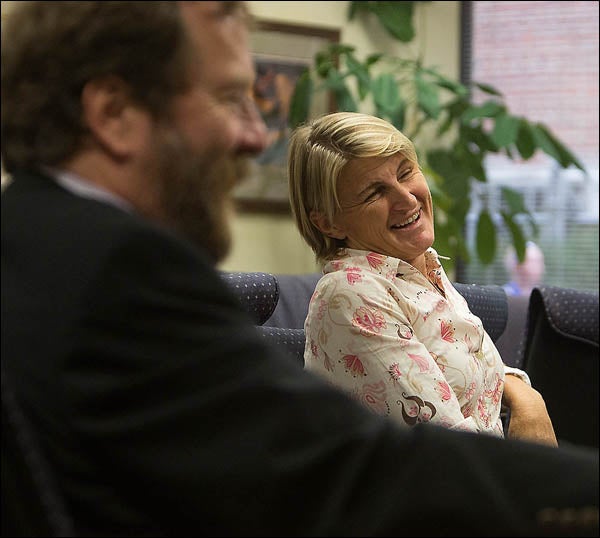SECRETS IN THE SAND
Famed paleoanthropologist shares passion for human history

Distinguished paleoanthropologist Dr. Louise Leakey, right, spoke with students at East Carolina University Oct. 2 before her presentation for the Voyages of Discovery lecture series. At left is Dr. Alan White, dean of the Thomas Hariott College of Arts and Sciences, which sponsors the series. (Photos by Cliff Hollis)
All human beings evolved from Africa, distinguished paleoanthropologist Dr. Louise Leakey told a capacity crowd in Wright Auditorium at East Carolina University Oct. 2.
We evolved into early people (hominids) around 7 million years ago; began making and using tools about 3.4 million years ago; developed into the modern body type (homo erectus) nearly 1.8 million years ago; and had larger brains (homo sapiens) just 600,000 years ago, said Leakey, explorer-in-residence for the National Geographic Society.
This has all occurred within a relatively short time frame, she said. Up until 50,000 years ago, she said there were at least four different species of early humans existing together.
“What we know from…fossils is that we all came from Africa, evolved in Africa and left Africa as homo sapiens,” Leakey said.
Leakey represents the third generation of renowned fossil hunters within her family. Like her parents, Richard and Meave Leakey, and her grandparents, Louis and Mary Leakey, Louise focuses her research on the evolution of early human ancestors.
She and her team have undertaken groundbreaking expeditions, unearthing deep insights into what it is that makes us human. She is credited for helping discover a 3.5 million-year-old skull and partial jaw, in 1999, believed to belong to a new branch of early hominids- Kenyanthropus platyops.
During the lecture, Leakey discussed the process of searching for fossils in the land of Eastern Africa, particularly in the Rift Valley and at Lake Turkana, where she and her parents, in collaboration with Stony Brook University, have established The Turkana Basin Institute.
Searching for fossils “is like looking for a needle in a haystack; looking for small bone fragments within the pebbles,” said Leakey. “The chances of us missing something are very high.
“Our past has an important role in making us think about our future,” concluded Leakey. “It’s extraordinary that we know as much as we do about human ancestry. We by no means have all the answers, and we never will.”
Leakey presented “Secrets in the Sand: Revelations into How We Became Human,” in the latest segment of the 2012-13 Voyages of Discovery Lecture Series, sponsored by the Thomas Harriot College of Arts and Sciences. The next speaker in the series is Colonel Eileen Collins, the first woman to pilot and command an American spacecraft, who will discuss “Leadership Lessons from Apollo to Discovery,” on Nov. 13 at Wright Auditorium.
For additional information about the Voyages of Discovery Lecture Series, visit the series’ website at http://www.ecu.edu/voyages.

Leakey said that searching for fossils is “like looking for a needle in a haystack” during a presentation at ECU Oct. 2.